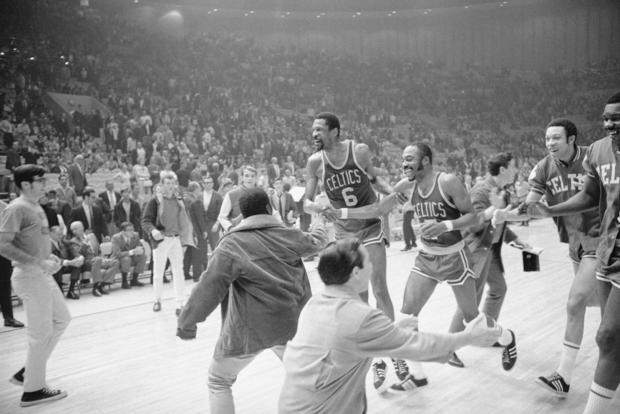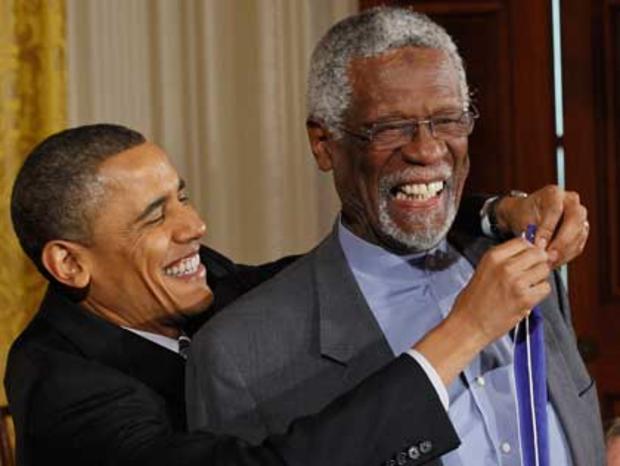Bill Russell, an NBA legend who led the Boston Celtics to a record 11 championships and is widely considered one of the greatest basketball players of all time, died on Sunday. He was 88.
Russell’s family announced his death in a statement, saying he died peacefully with his wife Jeannine by his side. The family did not disclose a cause of death.
The 6’10” former center dominated the NBA as a defensive and rebounding force over his 13-year career, winning five Most Valuable Player awards and becoming a 12-time all-star between 1956 to 1969. He also coached the Celtics over the last three years of his playing career, leading the team to two more titles on top of the nine he secured as a player.
NBA Commissioner Adam Silver said Russell “stood for something much bigger than sports: the values of equality, respect and inclusion that he stamped into the DNA of our league.”
“For nearly 35 years since Bill completed his trailblazing career as the league’s first Black head coach, we were fortunate to see him at every major NBA event, including the NBA Finals, where he presented the Bill Russell Trophy to the Finals MVP,” Silver said in a statement Sunday. “Bill was the ultimate winner and consummate teammate, and his influence on the NBA will be felt forever.”
Russell’s family also pointed to his long record of activism and social justice, saying his “understanding of the struggle is what illuminated his life.”
“Bill called out injustice with an unforgiving candor that he intended would disrupt the status quo, and with a powerful example that, though never his humble intention, will forever inspire teamwork, selflessness and thoughtful change,” the family said. “Perhaps you’ll relive one or two of the golden moments he gave us, or recall his trademark laugh as he delighted in explaining the real story behind how those moments unfolded. And we hope each of us can find a new way to act or speak up with Bill’s uncompromising, dignified and always constructive commitment to principle. That would be one last, and lasting, win for our beloved #6.”
In 1980, Russell was voted the greatest player in the NBA history by basketball writers. He remains the sport’s most prolific winner and an archetype of selflessness who won with defense and rebounding while leaving the scoring to others. Often, that meant Wilt Chamberlain, the only player of the era who was a worthy rival for Russell.
But Russell dominated in the only stat he cared about: 11 championships to two.
Bettmann
The native of Louisiana also left a lasting mark as a Black athlete in a city — and country — where race is often a flash point. He was at the March on Washington in 1963, when Martin Luther King Jr. gave his “I Have a Dream” speech, and he backed Muhammad Ali when the boxer was pilloried for refusing induction into the military draft.
In 2011, President Barack Obama awarded Russell the Medal of Freedom alongside Congressman John Lewis, billionaire investor Warren Buffett, German Chancellor Angela Merkel and baseball great Stan Musial.
“Bill Russell, the man, is someone who stood up for the rights and dignity of all men,” Obama said at the ceremony. “He marched with King; he stood by Ali. When a restaurant refused to serve the Black Celtics, he refused to play in the scheduled game. He ended insults and vandalism, but he kept on focusing on making the teammates who he loved better players and made possible the success of so many who would follow.”
Chip Somodevilla/Getty Images
On Sunday, Obama said in a statement that, “as tall as Bill Russell stood, his legacy rises far higher — both as a player and as a person.
“Perhaps more than anyone else, Bill knew what it took to win and what it took to lead. On the court, he was the greatest champion in basketball history. Off of it, he was a civil rights trailblazer,” Obama wrote.
Russell said that when he was growing up in the segregated South and later California his parents instilled in him the calm confidence that allowed him to brush off racist taunts.
“Years later, people asked me what I had to go through,” Russell said in 2008. “Unfortunately, or fortunately, I’ve never been through anything. From my first moment of being alive was the notion that my mother and loved father me.” It was Russell’s mother who would tell him to disregard comments from those who might see him playing in the yard.
“Whatever they say, good or bad, they don’t know you,” he recalled her saying. “They’re wrestling with their own demons.”
But it was Jackie Robinson who gave Russell a road map for dealing with racism in his sport: “Jackie was a hero to us. He always conducted himself as a man. He showed me the way to be a man in professional sports.”
The feeling was mutual, Russell learned, when Robinson’s widow, Rachel, called and asked him to be a pallbearer at her husband’s funeral in 1972.
“She hung the phone up and I asked myself, ‘How do you get to be a hero to Jackie Robinson?” Russell said. “I was so flattered.”
William Felton Russell was born on Feb. 12, 1934, in Monroe, Louisiana. He was a child when his family moved to the West Coast, and he went to high school in Oakland, California, and then the University of San Francisco. He led the Dons to NCAA championships in 1955 and 1956 and won a gold medal in 1956 at the Melbourne Olympics in Australia.
Celtics coach and general manager Red Auerbach so coveted Russell that he worked out a trade with the St. Louis Hawks for the second pick in the draft. He promised the Rochester Royals, who owned the No. 1 pick, a lucrative visit by the Ice Capades, which were also run by Celtics owner Walter Brown. Still, Russell arrived in Boston to complaints that he wasn’t that good.
“People said it was a wasted draft choice, wasted money,” he recalled. “They said, ‘He’s no good. All he can do is block shots and rebound.’ And Red said, ‘That’s enough.'”
The Celtics also picked up Tommy Heinsohn and KC Jones, Russell’s college teammate, in the same draft. Although Russell joined the team late because he was leading the US to the Olympic gold, Boston finished the regular season with the league’s best record.
The Celtics won the NBA championship — their first of 17 — in a double-overtime seventh game against Bob Pettit’s St. Louis Hawks. Russell won his first MVP award the next season, but the Hawks won the title in a finals rematch. The Celtics won it all again in 1959, starting an unprecedented string of eight consecutive NBA crowns.
The towering Russell never averaged more than 18.9 points during his 13 seasons, each year averaging more rebounds per game than points. For 10 seasons he averaged more than 20 rebounds. He once had 51 rebounds in a game; Chamberlain holds the record with 55.
Auerbach retired after winning the 1966 title, and Russell became the player-coach — the first Black head coach in NBA history, and almost a decade before Frank Robinson took over baseball’s Cleveland Indians. Boston finished with the best regular-season record in the NBA, but its title streak ended with a loss to Chamberlain and the Philadelphia 76ers in the Eastern Division finals.
Russell led the Celtics back to titles in 1968 and ’69, each time winning seven-game playoff series against Chamberlain. Russell retired after the ’69 finals, returning for a relatively successful — but unfulfilling — four-year stint as coach and GM of the Seattle SuperSonics and a less fruitful half season as coach of the Sacramento Kings.
Russell’s No. 6 jersey was retired by the Celtics in 1972. He earned spots on the NBA’s 25th anniversary all-time team in 1970, 35th anniversary team in 1980 and 75th anniversary team. In 1996, he was hailed as one of the NBA’s 50 greatest players. In 2009, the MVP trophy of the NBA Finals was named in his honor.
In 2013, a statue was unveiled on Boston’s City Hall Plaza of Russell surrounded by blocks of granite with quotes on leadership and character. Russell was inducted into the Basketball Hall of Fame in 1975 but did not attend the ceremony, saying he should not have been the first African American elected. (Chuck Cooper, the NBA’s first Black player, was his choice.)
In 2019, Russell accepted his Hall of Fame ring in a private gathering. “I felt others before me should have had that honor,” he tweeted. “Good to see progress.”

